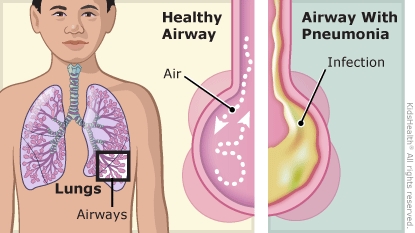MRSA Pneumonia: How to Care for Your Child
Pneumonia is an infection in the lungs. It is caused by different types of germs, such as bacteria or viruses. Your child's pneumonia was caused by the bacteria MRSA (methicillin-resistant Staphylococcus aureus). Your child began getting antibiotics while in the hospital, and is doing better, but might need several weeks to recover completely. Follow these instructions to care for your child at home.


-
Give your child the antibiotic as instructed by your health care provider.
-
If your child has a fever and your health care provider says it's OK, give one of the following exactly as instructed:
-
acetaminophen (such as Tylenol® or a store brand)
-
ibuprofen (such as Advil®, Motrin®, or a store brand)
-
Don't give your child aspirin because it's been linked to a rare but serious illness called Reye syndrome.
-
To soothe your child's cough:
-
Run a cool-mist humidifier, especially when your child is sleeping. Clean after each use.
-
If your child is older than 12 months, it's OK to give 1–2 teaspoons of honey at night. If your child is under 12 months old, do not give honey.
-
If your child is over 6 years old and is not at risk for choking, it's OK to give a cough drop or hard candy.
-
Don't give any cough or cold medicines if your child is under 6 years old. They can cause serious side effects. If your child is older than 6 years, ask your health care provider before you give cough or cold medicines.
-
Let your child rest as much as needed.
-
Give your child plenty of liquids. If it is easier for your child, give small amounts using a spoon or medicine dropper.
-
Don't allow anyone to smoke around your child. It can make your child cough more and get more lung infections.
-
Be sure your child has had all recommended vaccines. Some can help prevent certain kinds of pneumonia.

Your child:
-
has trouble taking the antibiotic
-
is not eating or drinking
-
has a new or higher fever
-
is not getting better after 2 days on the antibiotic
-
seems to be getting worse
-
has a cough that continues for more than a few weeks
-
has any of these signs of dehydration:
-
a dry or sticky mouth
-
peeing less
-
no tears when crying

Your child:
Call 911 if your child is struggling to breathe or turns blue.

What does it mean that MRSA (methicillin-resistant Staphylococcus aureus) is resistant to certain antibiotics? The germ Staphylococcus aureus changed, and an antibiotic (methicillin) that used to work on it no longer does. The germ is resistant to that antibiotic and others like it.
Does everyone with MRSA have symptoms? Some people carry MRSA on their skin and in their nose but have no signs of infection. They may carry MRSA for months to years. Other people who carry MRSA will get a MRSA infection.
How does someone get MRSA? Someone can become a carrier or get MRSA by touching the germ on a surface or on someone who is infected and then touching their own nose or skin. If someone has MRSA pneumonia, the germ may be spread through coughing.
People who have MRSA need to take special care to avoid spreading it by:
-
Keeping all cuts covered with a bandage.
-
Not sharing razors, towels, sports uniforms, or other items that might touch someone else's bare skin.
-
Putting a towel down before using sports equipment, and cleaning them after using.
-
Washing hands often using soap and water. If soap and water are not available, they can use a hand sanitizer with at least 60% alcohol.